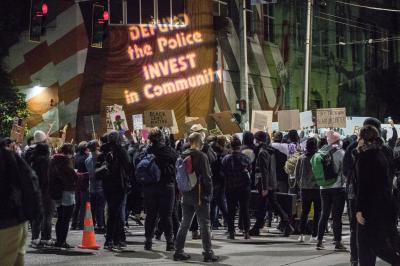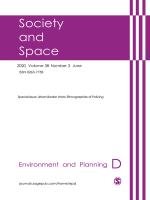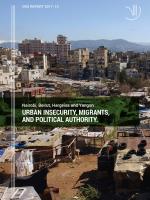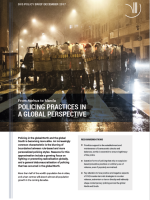What will defunding the police in the United States lead to?
Eight minutes and 46 seconds. That is how long a police officer pressed his knee against African American George Floyd's neck before he died. The video recording of the episode in Minneapolis has gone viral, reinforcing demonstrations against structural racism in the United States, protests that have spread to large parts of the world, both to support the Black Lives Matter movement and protest against police violence in the protesters' home countries. Alongside calls for justice and punishment of the guilty police officers, there is a growing demand for extensive reforms of the American police in the direction of less money and fewer tasks.
The size of the changes and budget cuts needed is still being debated among protesters, but the overall thinking seems new and radical for a country that annually spends $115 billion on the police, and the big question on everyone's lips is: Will it make a difference? Models that can serve as inspiration are reportedly hard to find, but according to DIIS Senior Researcher Peter Albrecht, we should look towards the Global South to understand why taking resources and tasks from the police is not necessarily the best solution:
‘Traditionally, the West has been sending policing experts to the Global South to reform, build and train local police forces following major disruptions and government collapses or as part of extensive democratization processes. The paradox, however, is that the very model used as a template for a fair and humane police system is steeped in major structural problems, including police violence and racism. This means that there are serious questions about what the West can really teach countries outside Europe and North America, but also what their legitimacy to do so is.’
Taking money from the police
‘Defund the police’ is one of the mantras coming out of the protests in the United States. It is an idea that protest groups have put forward for several years, but which has now gained extra traction with the recent incidents of police brutality. The idea is that public safety is best secured by investing in, for example, health and welfare rather than police and weapons. Money should be transferred from police budgets to other sectors to reduce points of contact between the population and the police. But that has limited effect at best, if the aim is to deal with the structural racism, says Albrecht. His research focuses on policing and security in countries in, for example, West Africa, where the police often have very few resources:
‘In recent years, we have seen a turn towards less bureaucracy concerning the police in the Global North, to get the police away from their desks, into the streets and closer to the citizens. This means that the actions of the police are much more dependent on what police officers are thinking in the moment and what their intuition tells them, which in turn is determined largely by their view on the society they are a part of. This is the case in the US and Denmark, as well as outside the West, where extensive bureaucratic control has never been strong. In Ghana, for instance, you often hear officers talk about using their “number 6”, that is, their sixth sense. The point is that if an officer lives in a society dominated by structural racism, this will of course also be reflected in his or her actions.’ And he continues:
‘The problem with removing tasks from the police is that it will not change their basic attitude towards their job – the view they have of who and what constitutes a criminal. Instead, there is a high risk that with a ‘defunding’ strategy the police will only be weakened and marginalized, rather than act the way the protesters want, for example, by showing less aggression towards specific groups. Also, when police officers feel less secure in the roles they are expected to perform, this can lead to more violence.’
Police-free zones – but who has the power?
Last week, protesters occupied the Capitol Hill neighborhood in Seattle after police pulled out following violent clashes. The district has been proclaimed a so-called police-free zone, initially called the Capitol Hill Autonomous Zone or CHAZ, and later the Capitol Hill Organized Protest or CHOP. The protesters talk about the area as what a community without a state-sanctioned police force might look like. But there are considerable downsides to when people take local safety into their own hands, says Albrecht:
‘What we are seeing in the US right now is a police force without legitimacy in the population, especially among black and other non-white citizens. They do not see the police as someone who protect them – on the contrary. This creates a breeding ground for alternative solutions, where people would rather, for example, call their own private networks before calling the police.
‘An example comes from my own research in Ghana, although it applies to many other countries as well. Here you have a police force that was born out of the British colonial administration. The police were established as a paramilitary force with the aim of protecting British interests rather than the population. Although the British have long since left the country, the basic idea that the police serve the interests of the rulers and not the population is still very much current. In addition, underfunding of the police means that police officers have to survive on very low salaries, which in many cases encourage corruption: traffic police take money from taxi drivers, the police demand money in order to investigate a case, and so on. The consequence is that the population does not trust the police, but also that the police have neither the resources nor the authority to monopolize law enforcement. This has led people to try and manage their own safety in other ways, for example, by setting up local vigilante groups, and in most countries in the Global South many citizens are involved in providing their own security.’

Although these vigilante groups or police-free zones, like the one that was set up in Seattle, are often portrayed as peaceful, non-violent protests and appear to be a necessary strategy to the population, the problems are imminent, according to Peter Albrecht:
‘When civilians take security into their own hands, the monopoly of violence is removed from the state, which is normally in the best position to ensure that this power is exercised relatively uniformly. What happens when disagreements occur within the protest group? Who solves the conflict, and who has the right to handle security in the area? And when there is no longer a central government bureaucracy to provide guidelines, who then ensures that these vigilante groups are held to account for their actions? It may sound like people are taking back the power and initiative, but that is to heavily romanticize the idea that the more locally decisions are made, the more stabilizing and fair they become. Political interests will always be at stake, also in these local settings – and when political interests are at stake about the organization of society, disagreements are inevitable and conflict a possibility.’
The police are a product of society – therefore there are no quick fixes
But if the solution is not to remove funds and tasks from the police, and thereby reduce their presence in the community, then what is? Here, it is important to understand that police and society are inextricably linked. As Albrecht explains:
’Ghana, Kenya, Sierra Leone – countries where I have worked to a greater or lesser extent – show that the police are determined by the basis from which they originate, such as a colonial state that has primarily been interested in safe-guarding its own financial interests. Once a whole political system and billions of dollars are built up around serving specific interests, it is certainly not going to change in a short amount of time.
There is no doubt about the importance of the widespread protests going on in the US right now, and protesters are right to demand structural change. BUT neither ‘defunding’ nor a civilian takeover of local security are appropriate solutions. In addition to the risk of creating some serious security problems, it will not fundamentally change the historical basis that the police have grown out of. To succeed in reforming the American police, a general societal change is required, combined with bureaucratic checks and balances, that secure control of the police’s actions. A long-term and politically difficult process lies ahead for the protesters, and especially the police, of course, but as examples from the Global South show us, there are no quick fixes. What remains is only the long-term difficult task of dealing with some of the basic principles on which a society is based.’
DIIS Eksperter







